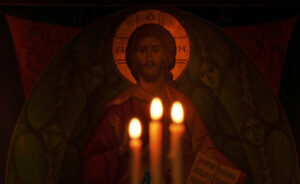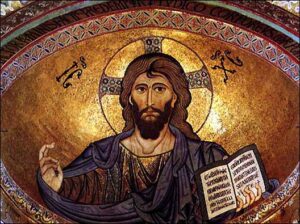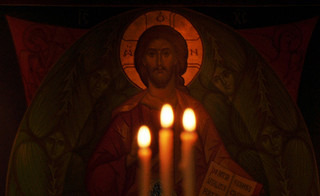 For many Evangelicals prayer is talking to God with the phrase “In Jesus’ Name. Amen.” added at the end. The emphasis is on praying sincerely from the heart. Little thought is given as to what makes for good mature Christian prayer.
For many Evangelicals prayer is talking to God with the phrase “In Jesus’ Name. Amen.” added at the end. The emphasis is on praying sincerely from the heart. Little thought is given as to what makes for good mature Christian prayer.
In this blog posting I want to discuss how Christian prayer is fundamentally Trinitarian in structure, and how inculcating a Trinitarian approach to prayer will deepen and strengthen our prayer life. Christian prayer is something more than the generally unstructured approach taken by many Evangelicals. How we understand God, especially God as Trinity, will have a profound effect on our spirituality.
What Is Christian Prayer?
For a brief period of time when I was an Evangelical I was attracted to the reverence and structure of the Episcopalian church. I found in its Book of Common Prayer (BCP) an eloquence and a theological sophistication that seemed absent in much of Evangelicalism. In the Catechism is a section “Prayer and Worship” which starts out:
Q. What is prayer?
A. Prayer is responding to God, by thought and by deeds, with or without words.
Q. What is Christian Prayer?
A. Christian prayer is response to God the Father, through Jesus Christ, in the power of the Holy Spirit.
I found here the link between our prayer life and God as Trinity. How we understand the Trinity influences the way we pray, and the way we pray affects our understanding of the Trinity. I had stumbled on the ancient principle of lex orandi, lex credendi: the rule of prayer is the rule of faith. This discovery would in time help me transition from modern Evangelicalism to historic Christianity. While I did find much to appreciate in the Episcopal Church, I was taken aback by the strong influence of liberal theology among the clergy. So, I never gave the Anglican option serious thought.
This Trinitarian approach to prayer is grounded in Scripture. In John 14:6 Jesus declared that he was the way to the Father; and in Romans 8:26-27 Paul taught that on our own we are incapable of praying but are able to pray because of the Holy Spirit’s intercession in us. Paul’s understanding of the Trinitarian structure of Christian prayer can be found in Ephesians 2:18: “For through him (Christ) we both have access to the Father by one Spirit.” (NIV; emphasis added)
Grammatically Incorrect Prayers
The discovery of the Trinitarian approach to prayer made me more alert and sensitive to the way people prayed. I soon became painfully aware how careless or inattentive Evangelicals were when they prayed. I heard prayers that were either nonsensical or heretical. These were not intentional heresies but the result of sloppy theology. What alarmed me though was the general indifference when I brought these errors to the attention of the leadership of my former home church.
My former home church celebrated the Lord’s Supper on the first Sunday of each month. The elders of the church would go up and sit behind the communion table. Then one elder would pray over the bread and another would pray over the grape juice. I remember one Sunday morning, the elder open with: “Dear Heavenly Father. . . .” then proceed to express his gratitude for God’s grace and love. This was all fine then I heard him give thanks for God dying on the Cross for our sins. When I heard that I knew what he had in mind, that he wanted to thank God for sending his Son to die for us. But due to his not distinguishing the persons of the Trinity he ended up inadvertently teaching the heresy of patripassianism: that God the Father suffered on the Cross.
At another Lord’s Supper celebration, I listened to the associate pastor, who graduated from Gordon-Conwell Theological Seminary, a leading Reformed seminary, committing a blooper while leading the congregation in prayer. He opened praying to Jesus Christ, recounted how Jesus died on the Cross for our sins, and closed with: “In your Name. Amen.” Grammatically, this was nonsensical because we pray to the Father through the Son. To pray to Jesus in Jesus’ name makes no sense. I brought it to the pastor who disregarded it as a trivial matter.
Then on another occasion I was praying with an Evangelical friend who was a seminarian at Fuller Theological Seminary. He opened with: “Dear Lord. . . .”, presented his prayer requests, then closed with: “In your name we pray. Amen.” Afterwards, I asked him which Person of the Trinity he was addressing the prayer to and all I got was an embarrassed shrug. Upon further reflection I realized that theologically this prayer was fundamentally Unitarian. Not that my friend was Unitarian, but his prayer was one that a Unitarian could easily have prayed.
The absence of a grammar of prayer became evident when I took part in a discussion with fellow seminarians at Gordon-Conwell. We talked about which person of the Trinity we preferred to address our personal prayers. High church Christians prefer to address their prayers to God the Father, Evangelicals prefer to pray to God the Son, Jesus Christ; and the charismatics like to pray to the Holy Spirit as well to Christ. The bottom line was that all three persons of the Trinity were divine and so it really didn’t matter whom we prayed to. During all this that line about prayer in the Book of Common Prayer stuck in my mind and made me realize that there was indeed a distinctly Christian approach to prayer. It made me call into question the soundness of Evangelical theology, especially if this theology exerted so little influence on the way Evangelical prayed to God.
Why We Pray In Jesus’ Name
 To pray “in Jesus’ Name” means that you are praying as He would pray. This means that you know what Jesus wants and that your desires are in line with His. Jesus’ Name is not a credit card that we can swipe to get what we want. That is why the Lord’s Prayer is so important for learning how to pray.
To pray “in Jesus’ Name” means that you are praying as He would pray. This means that you know what Jesus wants and that your desires are in line with His. Jesus’ Name is not a credit card that we can swipe to get what we want. That is why the Lord’s Prayer is so important for learning how to pray.
We learn from it that we are to seek the sanctification of the Father’s Name. This is a very Jewish notion of prayer. Further, we learn that we are to seek the kingdom of God here on earth—another very Jewish notion.
Christians pray in Jesus’ name because he is our great high priest (Hebrews 4:14-16) and because he is the only mediator between man and God (I Timothy 2:5). Many people think that because God is omnipresent and omniscient, he will hear everyone’s prayers no matter what. The weakness of this reasoning is that it separates God’s Being from his Person. Prayer is basically a person to person encounter. Also, it fails to take into account the Incarnation. In the Incarnation God the Father revealed himself specifically through His Son who took on human flesh (John 1:14; see also Matthew 11:27). Furthermore, by his death on the Cross Christ reconciled us to the Father restoring the possibility of communication with God (Hebrews 10:19-22). If we are alienated from God, not living in harmony with God’s will, prayer becomes an impossibility. Only if we turn back to God and seek to do God’s will is prayer possible. This is where faith in Jesus Christ is so crucial. God the Father sent his Son so that we could enter into relationship with him. This is the foundational basis for Christian prayer.
Christian prayer assumes our being baptized into Christ. As a result of the sacrament of baptism we are no longer autonomous beings alienated from God; we are now in Christ, reconciled to the Father. This is because in baptism we are baptized into Christ’s death and his resurrection (Romans 8:3-11). By means of covenantal adoption we are now children of God. When one becomes a Christian, Christ’s name becomes our name as well. An awesome responsibility is given to us. In the biblical worldview the name was identical with the person. So when you pray in Jesus’ name it means you are asking for what he wants. Thus, a certain responsibility comes with the authority to use Jesus’ name.
To be entrusted with another person’s name is an awesome responsibility even in the secular world. When I worked at the Hawaii legislature I would go down to the supply shop and sign out for whatever office supplies were needed. I was able to do so because of the authority of my boss. I ordered office supplies “in Senator Norman Sakamoto’s name.” I used this power judiciously. One, because to act irresponsibly would bring shame on my employer’s name and that of his office. Two, because to act irresponsibly would result in my access to the supply shop being cut off. This experience helped me to understand John 14:13-14 where Jesus taught:
And I will do whatever you ask in my name, so that the Son may bring glory to the Father. You may ask me for anything in my name and I will do it. (OSB)
Similarly, as Christians grow in maturity they come to know the mind of Christ and the more their thinking take on the kingdom perspective the more they are able to pray effectively in Jesus’ name.
Lex Orandi, Lex Credendi
The lack of structured prayers in Evangelicalism meant that when we prayed corporately the prayers offered quite often reflected the personal situation or the spiritual maturity of the person giving the prayer. This is both the strength and the weakness of Evangelicalism’s emphasis on personal prayer. It ends up as individualized prayer rather than the prayer of the community.
This desire for a more structured approach to prayer drew me to liturgical worship. There is structure in Evangelical and Protestant worship, but there seems to be a disconnect between the doctrine of the Trinity and the way they prayed. The Trinity was rarely invoked during Protestant worship except on solemn or formal occasions. But when I visited Episcopalian and Roman Catholic liturgies I was struck by how much more prominent the Trinity was in their prayers. Furthermore, the fixed prayers in these liturgical churches provided a balance and maturity that I usually did not sense at Evangelical or charismatic gatherings.
![]() But it was in the Liturgy celebrated by the Orthodox Church that my understanding of Christian worship underwent a paradigm shift. Where before I saw worship as an expression of what was inside me, I began to see the Liturgy as reshaping my spirituality, conforming me to the values and perspectives of the eternal worship in heaven. Where before I saw worship as expressive—expressing what is in my heart here and now, I now see worship as participatory—participating in the eternal heavenly worship. I soon became aware that there were a lot references to the Trinity! I stopped thinking about the Trinity and began to encounter the mystery of the Trinity. One of the high points of early Christian worship is the Trisagion Hymn:
But it was in the Liturgy celebrated by the Orthodox Church that my understanding of Christian worship underwent a paradigm shift. Where before I saw worship as an expression of what was inside me, I began to see the Liturgy as reshaping my spirituality, conforming me to the values and perspectives of the eternal worship in heaven. Where before I saw worship as expressive—expressing what is in my heart here and now, I now see worship as participatory—participating in the eternal heavenly worship. I soon became aware that there were a lot references to the Trinity! I stopped thinking about the Trinity and began to encounter the mystery of the Trinity. One of the high points of early Christian worship is the Trisagion Hymn:
After hearing this ancient hymn sung every Sunday for several years I stopped thinking of the Trinity as some complicated triangle diagram, or some syllogistic pretzel, but as a Mystery to be encountered in worship. The Sunday worship in turn spills over into the prayer life of Orthodox Christians during the week. Paul Evdokimov wrote:
It is not enough to say prayers; one must become, be prayer, prayer incarnate. It is not enough to have moments of praise. All of life, each act, every gesture, even the smile of the human face, must become a hymn of adoration, an offering, a prayer.
Many Orthodox Christians strive to follow a rule of prayer using the Morning Prayers and Evening Prayers. I found that these fixed prayers offer structure and balance that I did not find in Evangelicalism’s spontaneous “from the heart” spiritual tradition. I also discovered that these prayers have an eschatological aspect to them. Prayer is eschatological because it makes us sharers in the kingdom of God.
Prayer as Journey
 Prayer is a journey that takes us into the mystery of the Trinity.
Prayer is a journey that takes us into the mystery of the Trinity.
A life of prayer will result in a transformed life. This process of transformation is theosis (deification).
Jesus prayed:
And the glory which You gave Me I have given them, that they may be one just as We are one. I in them, and You in Me; that they may be made perfect in one…. (John 17:22-23, OSB)
We are meant to be partakers of the divine glory shared by the Father and the Son. We are called to be in the Son just as the Son is in the Father. Thus, the Trinitarian structure of prayer reflects the basic purpose of prayer to draw us into the life of the Trinity: Father, Son, and Holy Spirit.

Great post. This was one of the things that first hit me when I converted to Orthodoxy. I had only prayed in “Jesus name” before. I have grown to appreciate the Trinitarian emphasis of our prayers. God exists in relationship as Trinity from eternity past. To pray to God invokes this love relationship that extends to us.
Excellent article. The prayers of the Evangelical church have disturbed me for quite a while. Third time through our doctrines class and I might now finally be getting through to people that we need to take prayer seriously. Thanks for the words.
Thanks for the article. Is there any authority expressly stating or from which is necessarily follows that we should not pray to the Second or Third persons of the Holy Trinity? Apart from such authority, it would otherwise seem odd that we can pray to the saints but not to Jesus or to the Holy Spirit.
Ross,
Welcome to the OrthodoxBridge! You asked some good questions. First of all, I do not want to discourage people from praying to Christ or to the Holy Spirit. The Orthodox Church does have prayers directed to Christ or to the Holy Spirit. For example, the Morning Prayer opens with: “O Heavenly King, O Comforter, the Spirit of Truth, Who are in all places and fill all things and the Giver of life. Come and abide in us, cleanse us from every stain, and save our souls, O Good One.” This prayer is then followed by the Trisagion prayer. I don’t want to promote the pharisaical attitude of a grammar police, but I do want to encourage clear thinking in our prayer. My recommendation is that Christians steep themselves in the liturgical tradition and the prayer classics, then allow these classic prayers shape and inspire our personal prayers.
With respect to the saints, again it is important that we become acquainted with the grammar of prayer. We pray with the saints to God. It would be a mistake to think that one prays to the saints because they stand between us and God; Christ alone is our Mediator to the Father. But having said that, one thing I appreciate is Orthodoxy’s constantly reminding me that I am surrounded by such a great cloud of witnesses who have gone before me.
Robert
Thanks for your response.
The Book of Common Prayer was the ‘gateway drug’ for me. I learned to pray morning and evening prayers from it. I learned to pray the Psalter. It served me well for over three years, and when I started meeting with our Orthodox priest, he did not suggest that I change my practice. Eventually I suggested that I probably should start using an Orthodox prayer book, and father agreed and suggested the prayer book put out by Holy Transfiguration Monastery. While I love the BCP, I have not looked back since then. The ethos of Orthodox prayers, in my humble opinion, beats anything found in the Protestant/Evangelical world, hands down.
Thank you for reminding me from where I have come. Old habits die hard, though. When I am asked unexpectedly to pray, I revert to extemporaneous patterns, and have to consciously choose a trinitarian conclusion.
Then there is the constant struggle to be continually present in my prayers. The most finely composed prayers are only as effectual as the intent that you put into them. Keeping the mind from wandering is (for me, at least) a constant struggle.
George,
Thanks for sharing! I still have the BCP on my bookshelf, but like you I have not looked back. And it’s good to hear that you have a priest who is patient and kind in his spiritual counsel.
Robert
Great stuff y’all. (thanks george)
I’m paraphrasing-together here, but my 1st Chatech…meeting with my Priest went something like this…
“You’ve listened to and read lots of good stuff I don’t think we need to major in during this time. It’s the DL, Services and hymns you need most now. And especially learning to pray like an Orthodox…steeped in the historic prayers of the faith and learning to be quiet and present in your praying. This is what will make you become truly Orthodox.”
Three weeks in…he couldn’t’ve been more right. Lord have mercy.
david
David,
I like what you wrote. You’re thinking like an Orthodox Christian!
Robert
Thank you Robert.
This is useful stuff.
Minor issue, but isn’t it lex orandi, lex credendi? I do find it highly ironic that the phrase is Latin and not Greek. 🙂
Prosper of Aquitaine:
“… obsecrationum quoque sacerdotalium sacramenta respiciamus, quae ab apostolis tradita, in toto mundo atque in omni catholica Ecclesia uniformiter celebrantur, ut legem credendi lex statuat supplicandi.”
Thank you for this citation.
For you all:
“And we respect the sacraments of prayers and of priests which were handed down by the apostles and celebrated uniformly in the whole world and in every catholic church, so that the rule of supplication may inform the rule of belief.”
Andrew,
Welcome to the OrthodoxBridge!
Robert
Prometheus,
Thanks! You are right. Apparently I confused “lex orandi” (rule of prayer) with “orans” (the gesture of praying with outstretched arms). I’ll have to brush up on my Latin. I don’t think it ironic that many important theological phrases were in Latin, e.g., imago dei, regula fidei, consbustantial, deification, etc. The Latin theological tradition is a rich one with many important church fathers like Leo of Rome, Ambrose, Vincent of Lerins, and Pope Gregory the Great. Orthodoxy is catholic, it embraces both the east and the west.
Robert
“With or without words…”
I’ve always wondered…when Jesus withdrew into the mountain to pray all night…what was he actually doing? What words were spoken? Any at all?
Bill,
Welcome to the OrthodoxBridge! I think it was a mixture of praying with words and resting in God’s presence.
Robert
Very, very nice, Robert. Thank you.
I am simply overwhelmed at the ever-presence of the Trinity in Orthodox faith and practice. There’s no escaping it, no matter where one turns.
J
Justin,
Thank you! I pray that your prayer life will deepen and you become even more deeply rooted in the love the Father has for the Son and the love the Son has for the Father (John 17:26).
Robert
There you go again.
😉
Justin
Hi Robert,
Orthodox Bridge was extremely helpful in my journey into the Orthodox Church from an Evangelical background. Thank you! I’ve been trying to figure out just how recently the prayer termination “in Jesus’ name, Amen” came into popular use. Specifically, I’m interested in the practice where it’s tacked on to the end of a prayer. I’m having some difficulty tracking this down, but it seems like it could be as late as the 19th or 20th century. Do you recall seeing instances of this formula earlier than this?
Thanks!
Phil
Phil,
Great question! Sorry, I don’t know the answer. One thing you could do is interview the Protestant Christians you know in their 80s or 90s. You could have them pray with you for a few minutes and while they are praying you could listen to the grammar of their prayers. Afterwards you could ask them what they remember about how people prayed and how they closed their prayers. And then you could ask if they have any recollections of how their parents or their ministers prayed. God bless!
If anyone knows something please feel free to comment. Thanks.
Robert